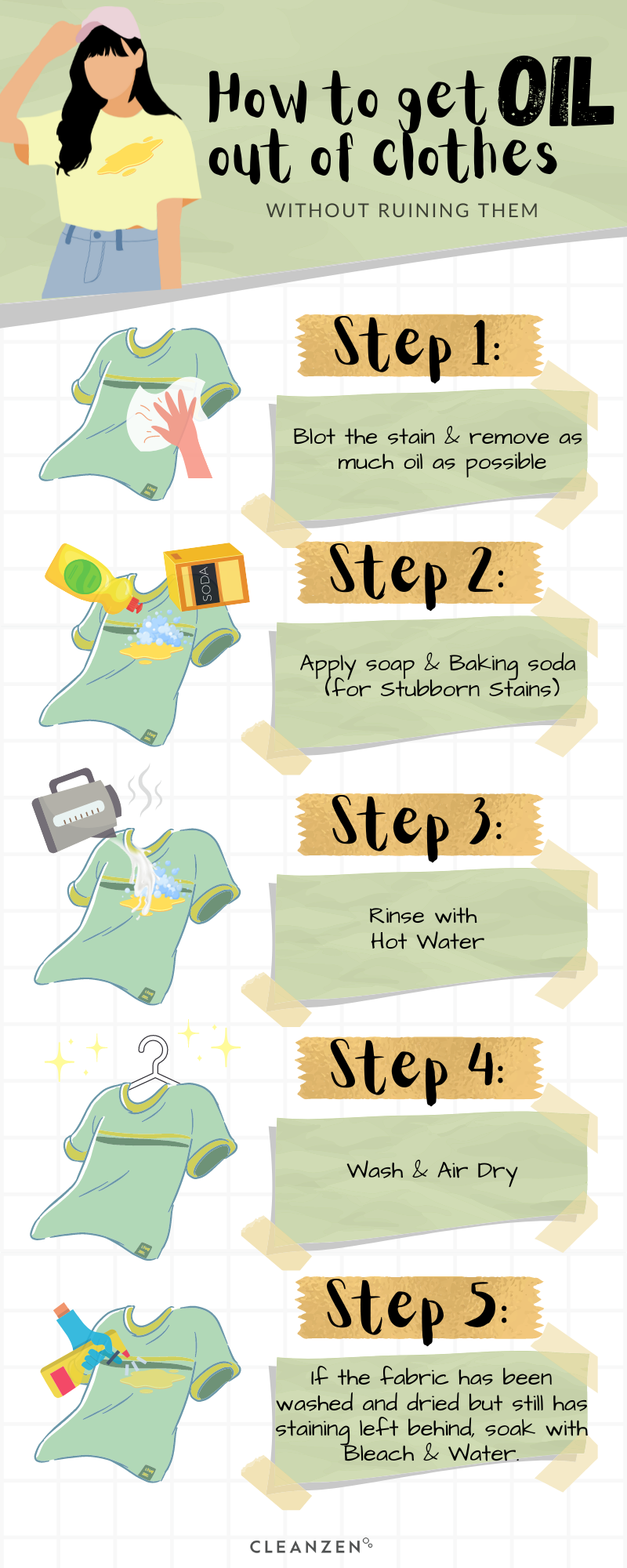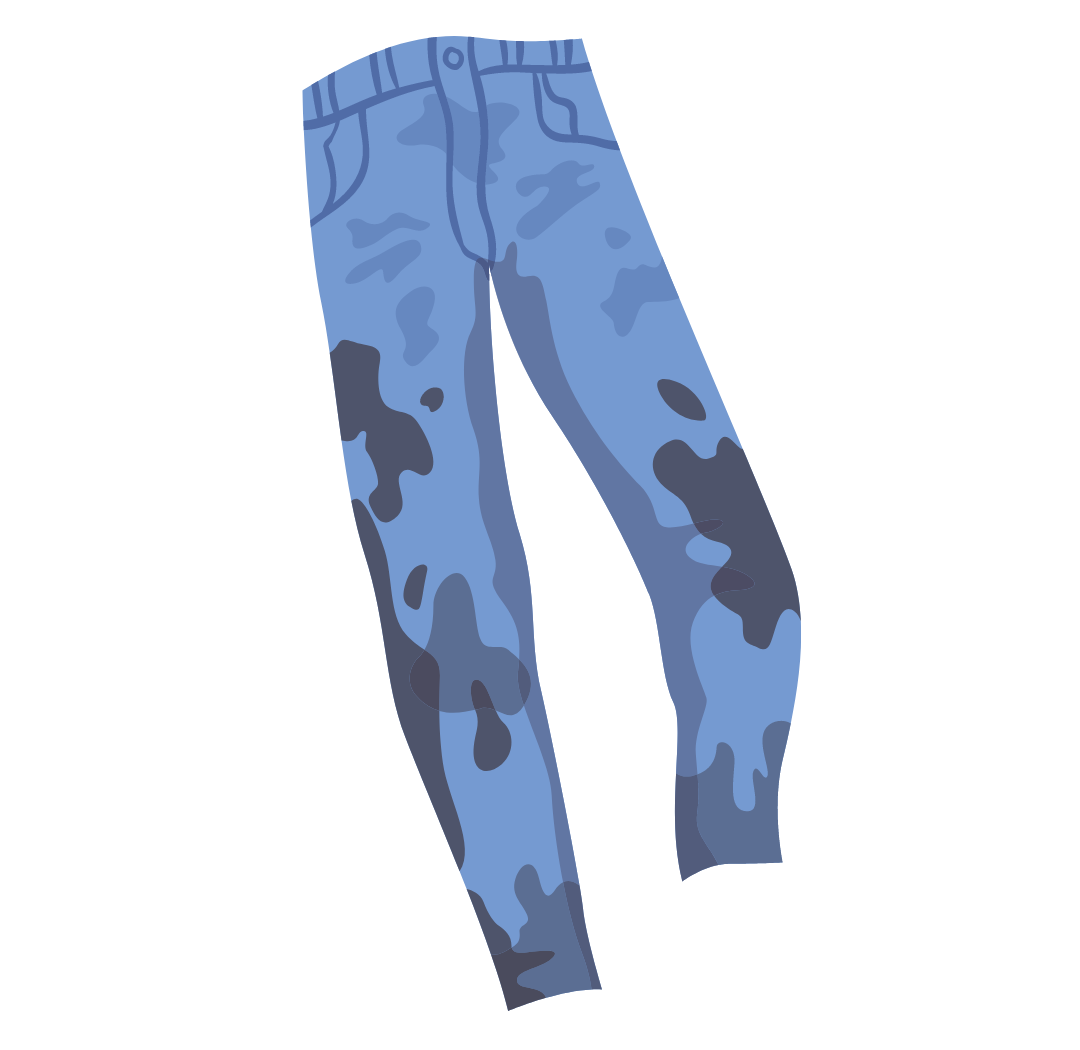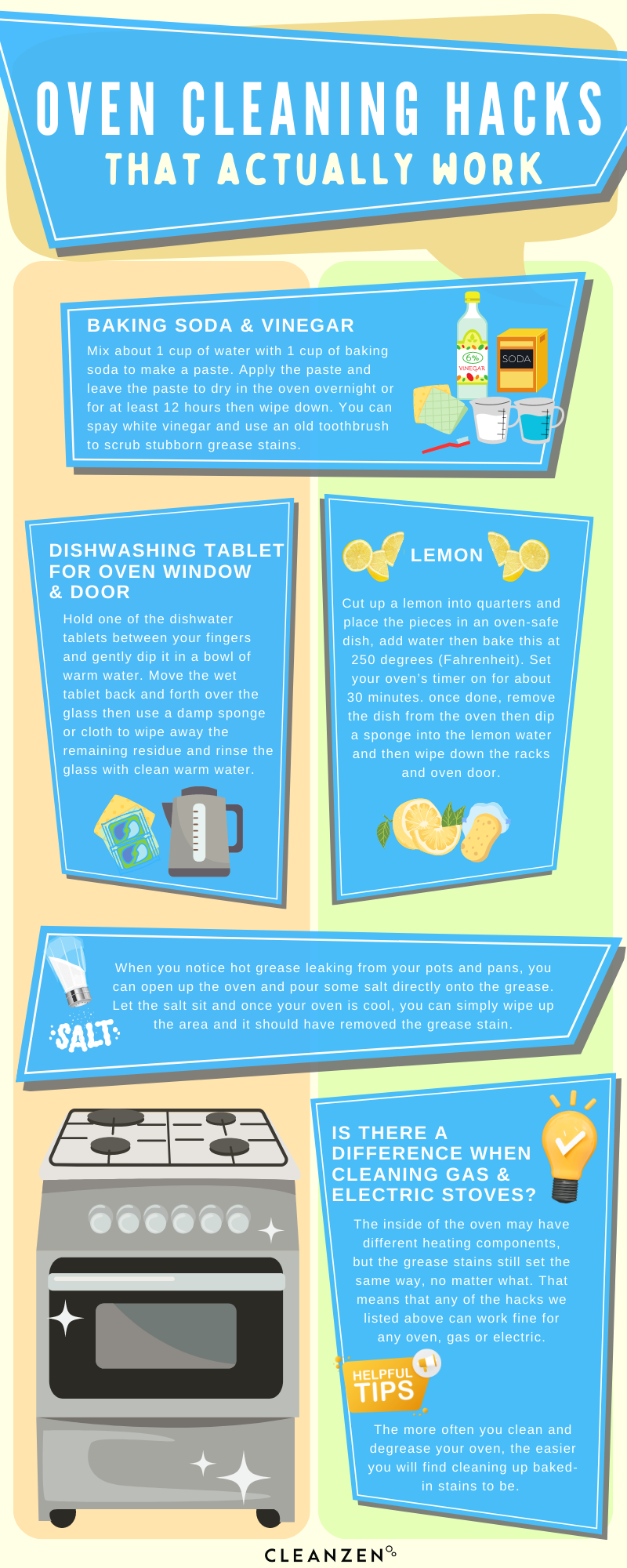
A nice big bite of a juicy hamburger or hovering over a cooking pan without an apron can catch anyone by oily surprise, it happens to us all even at the worst times. Accidents happen no matter how hard you try to avoid them, but that doesn’t mean you have to say goodbye to your favorite shirt.
Follow our quick and easy method below to learn the best tips for removing stubborn oil and grease stains from your clothing.
Why Are Oil Stains So Difficult to Remove?
Grease and oil leave behind some of the most annoyingly stubborn stains on clothing. These stains can be hard to clean, but luckily it is not impossible. How successful the removal is really depends on the state of the stain, the material, the color of the fabric, and the method you use to clean it.
Even if a stain is small and light when you first catch it, it can darken on the fabric over time as it sets in, which is why it’s essential to remove them as soon as possible. The longer you wait to treat and remove the stain, the more absorbed the oil and grease will become into your clothing.
Once it dries, the stain will be pretty difficult to remove and might even ruin your clothes. So how do you save your clothing before those annoying stains have time to set in? Keep reading to find out what tips and tricks we have for you.
What You’ll Need to Get Oil Out of Clothes
When you are checking around your home to find the right things to use against an oil or grease stain, you’ll want to make sure you use the right products and tools. Here is a general list of products you can use to treat oil stains, according to the method we provided below:

How to Get Oil Stains Out of Clothes
Got your supplies and feeling ready to tackle those pesky oils stains? Here is our go-to method for removing oil stains from your clothes, along with a few extra steps for more stubborn and set-in stains:
Blot the Stain
Use a paper towel, napkin, or microfiber cloth to blot away as much of the oil as possible as soon as you notice the stain. This will make it easier to clean and treat the stain once you start washing it. Avoid rubbing at the stain, as this will only push the grease and oil deeper into the fabric’s fibers and make it even harder to fully remove it.
Apply Soap
Lay the piece of clothing on a flat surface and put a few drops of dish soap directly onto the stain. Work the soap into the fabric with your hands or with a toothbrush to bring the soap to a lather to loosen the oil and grease.
Apply Baking Soda (for stubborn stains)
If you’re dealing with more stubborn and set-in stains, sprinkle a bit of baking soda directly onto the stain with the dish soap. Scrub the powder and soap with a toothbrush and then let it sit for a few minutes until the baking soda dries slightly and covers the stain in a hard paste.
Rinse with Hot Water
After you’ve allowed the dish soap, and baking soda if needed, to work on fighting the stain for about an hour, rinse the clothing with hot water. Once you are done, dip the affected area on the fabric in hot water and leave it for another hour.
Wash & Air Dry
Once the stain is all but gone from the clothing, wash the garment in your washing machine on a warm water cycle and then let it air dry rather than in your dryer. If the stain has not been completely lifted and removed, you may want to repeat the previous steps once again.
Soak with Bleach & Water (for stubborn stains)
Sometimes, stubborn stains can require more drastic measures. If the fabric has been washed and dried but still has staining left behind, dip it in some warm water mixed with a color-safe bleach and let allow this to sit for about an hour. Once it has been left to soak, wash and dry the garment as normal.
Tips, Tricks, & FAQs
How to Get Motor Oil Out of Clothes?
 Treating and removing motor oil stains has pretty much the same process as regular oil. Blot away as much of the stain as possible, apply dish soap and baking soda and scrub the mixture with a toothbrush, rinse and soak in hot water, and then run through the washing machine.
Treating and removing motor oil stains has pretty much the same process as regular oil. Blot away as much of the stain as possible, apply dish soap and baking soda and scrub the mixture with a toothbrush, rinse and soak in hot water, and then run through the washing machine.
Are Oil Stains Permanent?
The short answer is, they can be. However, if you catch and treat oil stains quickly, you have a better chance to remove them. The best course of action is to blot fresh stains quickly and treat them even quicker. The longer you wait to treat oil or grease stains, the more likely they are to be permanent.
Unfortunately, success isn’t always guaranteed and you can sometimes be left with a permanent stain. The fibers and fabric of your clothing may contribute to how stubborn oil and grease stains can be. Synthetic fibers like polyester are incredibly difficult to clean because oil and excess grease particles stick to them like magnets, meaning that without proper care and attention, stains could become permanent and ruin your clothes for good.
How Do You Get Oil Stains Out of Jeans?
You can approach oil stains on your jeans and other denim as you would on any other piece of clothing, and since denim is generally made from natural fibers, it is usually more accepting of stain removal than synthetic fibers. Start by blotting the stain so it doesn’t settle into the fibers If you’re out and can’t remove your jeans, use a bit of salt or artificial sweeteners on the stain to soak up as much of the offending oil until you can give your jeans a deep clean at home using the method we provided above.
If you’re out and can’t remove your jeans, use a bit of salt or artificial sweeteners on the stain to soak up as much of the offending oil until you can give your jeans a deep clean at home using the method we provided above.
How to Get Old Oil Stains Out of Clothes
Dried oil stains are much more difficult to get out of clothing, but luckily it is not a completely impossible task. The first thing you’ll have to do to remove the stain is attempt to return the oil stain to a liquid state by using hot water. If that doesn’t work, add a little more oil to help revive and loosen it up.
Many people actually swear by treating oil and grease stains with WD-40. You can do this by spraying a small amount into a bowl and applying it with cotton swabs. Place a towel or microfiber cloth on the other side of the fabric so that the oil stain doesn’t soak through to the back of the clothing item. Once the stain has been treated with the WD-40, soak up the remaining stain using the same method we provided above, and then wash and dry the garment as usual.
Is Hot or Cold Water Better for Removing Stains?

Oil and grease are usually semi-solid at room temperature, meaning that it needs to be fully liquid to be properly removed. The best way to liquify grease spots and stains on fabric is to use warm or hot water when treating and washing the garment.
Is White Vinegar a Degreaser?
Distilled white vinegar is our favorite degreaser! To use it o help treat oil and grease stains, mix it with some water. We recommend about 1 part vinegar to about 4 parts water. Apply this solution directly to the grease and let it sit for a few minutes to an hour.
That pungent vinegar smell will dissipate once the item is completely dry, and especially after you run it through the wash. Remember to test in an inconspicuous area before applying the solution to stains because even diluted vinegar can discolor certain fabrics.
What Mistakes Should You Avoid When Removing Oil Stains?
- Always blot, never rub, a stain, including oil stains.
- Always try and address an oil stain immediately so it doesn’t have time to settle into the fabric and dry.
- Since oil stains are, avoid using any water on an oil stain. If the stain has dried, then you should only use hot water.
Remember, speed is key when treating and removing oil from clothes. Work as fast as you can and you should be able to remove any oliy stains from your clothes easily. For more cleaning tips and tricks, and to book services for your home or business, check out Cleanzen Cleaning Services today!
The post How to Get Oil Out of Clothes (Without Ruining Them!) appeared first on Cleanzen.
from Cleanzen https://cleanzen.com/blog/how-to-get-oil-out-of-clothes/
via IFTTT
From https://cleanzencleaningservices00.blogspot.com/2023/05/how-to-get-oil-out-of-clothes-without.html
from Kirstie Bravo https://kirstiebravo.blogspot.com/2023/05/how-to-get-oil-out-of-clothes-without.html
via IFTTT
from Kirstie Bravo https://kirstiebravo.wordpress.com/2023/05/17/how-to-get-oil-out-of-clothes-without-ruining-them/
via IFTTT

No comments:
Post a Comment